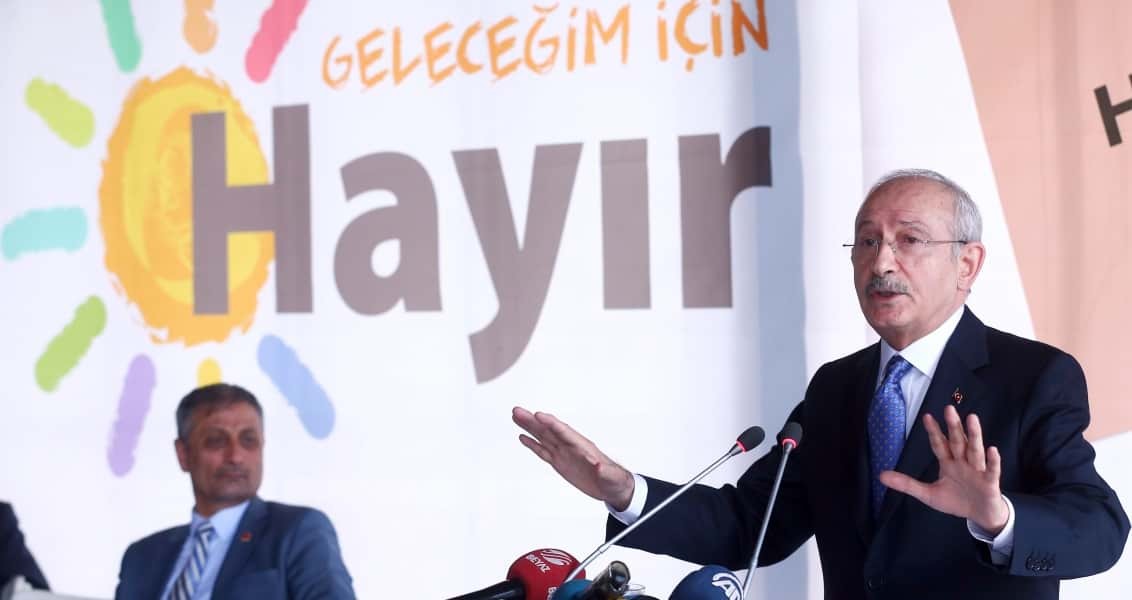
'No' Campaign Pulls a Trick Out of European Far Right's Playbook
CHP spread fear and fuel hatred against Muslims, immigrants and refugees. They resort to racism. As such, Mr. Kılıçdaroğlu appears to have positioned himself as the Turkey branch of European far-right extremism.
Share
Turkey's foreign adversaries and the domestic opposition have something in common: Both groups have embraced the politics of fear and misinformation. In an effort to help the "no" campaign succeed in the April 16 constitutional referendum, they wish to make voters paranoid by invoking completely unfounded arguments.
When the presidentialism debate originally started, opponents falsely claimed that reforming Turkey's system of government would inevitably lead to federalism. Obviously, they were trying to tap into fears of territorial disintegration. If the people were convinced that constitutional reform would threaten the country's very existence, they reasoned, the plan would have been blocked from the beginning. When it became clear that the proposal would maintain and strengthen unitarism, critics dropped the claim overnight. Instead, they started to complain that the new system of government would fuel polarization.
Moving forward, they invoked another unfounded argument that constitutional reform would lead to regime change. Having once claimed that democracy would collapse due to the lifting of a headscarf ban on college campuses, the Republican Peoples' Party (CHP) leadership was unsuccessful this time around. Realizing his inability to trigger a crisis, CHP Chairman Kemal Kılıçdaroğlu even attempted to explain the definition of the word regime at a public event.
Then came the third lie: The new system of government, they claimed, would fuel authoritarianism and one-man rule in Turkey. Needless to say, this argument proved ineffective as well. When the voters found out that the president would control the executive branch alone, rather than preside over the executive, the legislative and the judicial branches. Day by day, it became clear that the domestic opposition would be unable to get the job done.
This is when Turkey's adversaries in the West themselves stepped in and launched a "no" campaign defined by the belief that the ends justified the means. On one hand, they enlisted the services of media outlets to demonize President Recep Tayyip Erdoğan. On the other, they imposed an arbitrary ban on public appearances by spokespeople for the "yes" campaign. Before long, symbolic violence gave rise to physical violence. At the same time, Western governments not only allowed terrorist groups such as the Gülenist Terror Group (FETÖ), the PKK and the Revolutionary People's Liberation Party-Front (DHKP-C) to operate within their borders but also worked with them. The bar kept going lower and lower. Finally, on Saturday, PKK and DHKP-C militants organized a joint rally and carried a huge sign depicting the Turkish president with a gun to his head and called for his assassination. The same day, a far-right American commentator tweeted in Turkish to claim, "Erdoğan has reached the end of the road."
The Turkish people understand that such attacks are intended to dishearten them and break their will. They know that Turkey's adversaries wish to keep their country on a tight leash.
Desperate to find new ways to oppose constitutional reform, Mr. Kılıçdaroğlu came up with a final lie. He claimed that the government will "grant citizenship to 4 million refugees if the bill passes." To be clear, his latest statements did not surprise anyone because his allies in Europe do the exact same thing. They spread fear and fuel hatred against Muslims, immigrants and refugees. They resort to racism. As such, Mr. Kılıçdaroğlu appears to have positioned himself as the Turkey branch of European far-right extremism. What can I say? He clearly looks the part.
[Daily Sabah, 29 March 2017]
Tags »
Related Articles






